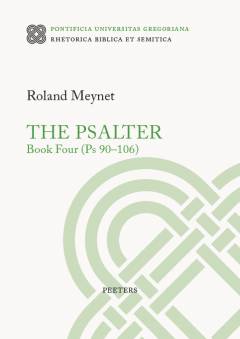
- Retrait gratuit dans votre magasin Club
- 7.000.000 titres dans notre catalogue
- Payer en toute sécurité
- Toujours un magasin près de chez vous
- Retrait gratuit dans votre magasin Club
- 7.000.0000 titres dans notre catalogue
- Payer en toute sécurité
- Toujours un magasin près de chez vous
Description
The composition of the fourth book is in no way inferior to that of the other four books already analysed. Its three major sections, each containing five psalms, are organised in a concentric fashion; they are linked by two short sections which constitute the focal points of the ellipse that the whole book draws. The extreme sections are related. The first section (Ps 90-94) describes "the fate of the children of Adam", the last one (Ps 102-106) "the fate of the children of Israel". All are subject to the law of human affliction. They are like the grass that flourishes in the morning and withers and dries up in the evening; and sin accompanies frailty. As the refuge of humanity from generation to generation, the Lord saves people by satisfying those who fear him for many days and by assuring his faithfulness to the children of their children, from age to age. Despite their repeated unfaithfulness, God does not grow weary of forgiving them. The central section (Ps 96-100) stands out from the rest of the book, which it overshadows. All peoples are called to come to Jerusalem to worship the King of the universe and to bless him who has saved the chosen people from among all the families of the earth. Carried by the promise of the one God and by the hope of the one people, this invitation is situated on the unattained, but always desired eschatological horizon. The focal points of the ellipsis (Ps 95 and Ps 101) are the key to reading the book. The first one focuses on a wish addressed to humans: "Today if you would only listen to his voice" (Ps 95:7). The second one poses a question to God: "When will you come to me?" (Ps 101:2). Therefore, the whole fourth book is captured in this tension between God's desire and human desire, each going to meet the other, in a "today" whose fragility places every human being between the morning when the grass flourishes and the evening when it dries up, between the time of the fathers, which the last section evokes at length, the time of sin and forgiveness, and the time of salvation and of the end, which the central section contemplates.
Spécifications
Parties prenantes
- Auteur(s) :
- Editeur:
Contenu
- Nombre de pages :
- 281
- Langue:
- Anglais
- Collection :
- Tome:
- n° 37
Caractéristiques
- EAN:
- 9789042948525
- Date de parution :
- 02-03-22
- Format:
- Livre broché
- Format numérique:
- Trade paperback (VS)
- Dimensions :
- 170 mm x 240 mm
- Poids :
- 7928 g

Les avis
Nous publions uniquement les avis qui respectent les conditions requises. Consultez nos conditions pour les avis.






